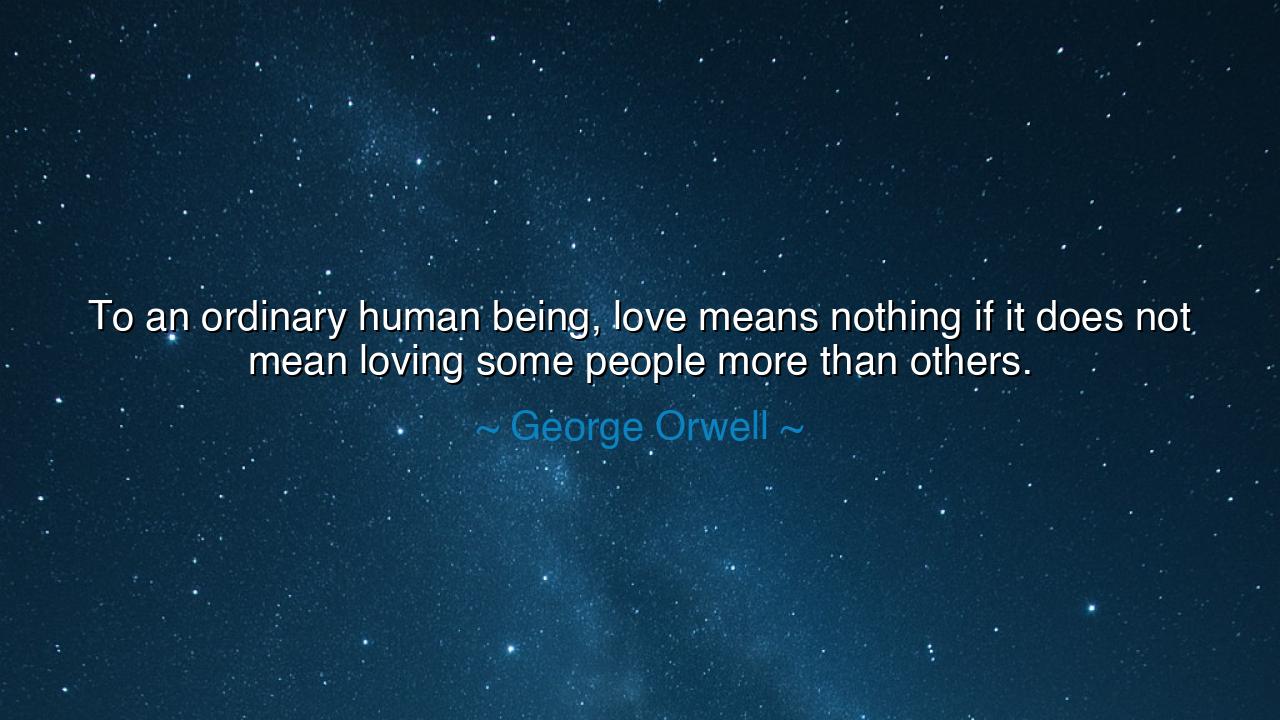
To an ordinary human being, love means nothing if it does not
To an ordinary human being, love means nothing if it does not mean loving some people more than others.






“To an ordinary human being, love means nothing if it does not mean loving some people more than others.” Thus spoke George Orwell, the great seer of truth and the chronicler of the human condition. In these words, he lays bare a paradox both simple and profound — that while philosophers and preachers may speak of loving all humanity equally, the heart of man beats in particulars, not in abstractions. True love, Orwell teaches us, is not a cold and generalized compassion, but a fierce and living flame directed toward those few who have touched our souls. It is in loving deeply, not broadly, that our humanity finds its truest expression.
Orwell, who lived through war, tyranny, and moral upheaval, understood the frailty and grandeur of the human heart. His quote is not a rejection of universal kindness, but a defense of authentic feeling — of love that is real, rooted, and imperfect. He had seen how great movements and ideologies often speak of loving “mankind” while crushing the individual. For what is the love of humanity, he asks, if it is not born from the love of one single person? It is easy to claim to love all — it costs nothing. But to love some, to love specifically, to love sacrificially — that is where love becomes flesh and blood.
Consider the story of Mother Teresa. She did not set out to love all humanity through grand speeches or sweeping visions. She began by caring for one dying man on the streets of Calcutta. She washed his wounds, gave him comfort, and in that small act, she revealed the infinite power of personal love. Through loving some — the poor, the forgotten, the sick — she ended up loving all. But the beginning was intimate, particular, human. This is Orwell’s truth: that love begins not in ideology but in relationship, not in principles but in persons.
For to love equally, as Orwell implies, is to love falsely. If we love everyone the same, we love no one deeply. The heart is not a machine that dispenses affection evenly; it is a sacred vessel that overflows when it finds connection. To say one loves a child, a friend, a beloved, “more than others” is not to diminish others — it is to recognize the divine truth that we were made to bind our souls to a few. It is in these chosen bonds that we learn tenderness, loyalty, sacrifice, and mercy. Without them, our love remains an idea — admirable, but lifeless.
The ancients knew this well. The philosopher Aristotle wrote that friendship, the highest form of human relationship, requires preference — one must care for another as “one’s own soul.” Even the gods, in myth, loved particularly: Zeus loved Hera, Odysseus loved Penelope, Christ loved his disciples and wept for Lazarus. Each story reminds us that it is through our specific loves that we learn the language of compassion. Only those who have truly loved one can begin to love many.
Yet Orwell’s words also carry a warning — that when love is stripped of its humanity and replaced by slogans of collective affection, it becomes hollow. He wrote these lines in the shadow of totalitarianism, where leaders preached love for “the people” while destroying the individual. His message, then, is both tender and defiant: to love personally is to resist dehumanization. When you choose to love a friend, a family member, a partner — when you give more of yourself to them than to the faceless crowd — you preserve what makes you human in a world that would make you uniform.
So, my child, learn this lesson and live by it: love personally, love deeply, love specifically. Do not be ashamed that your heart favors some, for that is its design. Let your love be real — a fire that warms those closest to you, rather than a mist that touches everyone but nourishes none. Begin with those before you: your family, your friends, your neighbor in need. From those small circles of affection, the ripples of true compassion will spread outward, reaching farther than you can see.
And remember always: it is not by loving all equally that we make the world better, but by loving some completely. Through these bonds, we learn patience, forgiveness, and the grace that lifts the soul. Thus does the ordinary human being find meaning in love — not in loving the world in theory, but in loving, with all the strength of the heart, those few who make the world worth living in.






AAdministratorAdministrator
Welcome, honored guests. Please leave a comment, we will respond soon